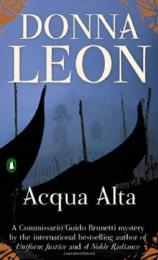Reading Group Guide
Discussion Questions
Acqua Alta: A Commissario Brunetti Novel

1. Water-specifically, the rising waters from the driving rains that lend the book its title-is one of the recurring leitmotifs of Acqua Alta. Consider Leon's use of water throughout the book; what is it a metaphor for? How do the different characters react to the water, and what does that say about them? Think, for example, of how Brunetti's view of the waters differs from, say, that of Salvatore La Capra's (p. 355). Finally, consider the city's relationship to water; how is Venice shaped (both literally and figuratively) by water? What do you think Leon is saying about the unpredictability (and power) of nature and man's ability to live with it?
2. Acqua Alta is peopled with a number of colorful characters-Commissario Brunetti, of course, but also Flavia, Brett, and the La Capras. But the most important character is not a person at all-it's the city of Venice. Consider each of the major characters' relationship to the city; what does their affinity for (or dislike of) this city on the water reveal about their personalities? What literary devices does Leon employ to make the city into a character? Can you think of other books in which the location becomes as important to the plot as the characters' own lives and machinations?
3. Like his friend Lele and his wife, Paola, Brunetti is a die-hard Venetian, fiercely proud of everything that makes his city unique, from its exceptional beauty to its many flaws. As Leon reminds us throughout the book, Venice is a small and tightly-knit city, a city both intensely cliquish and dependent upon tourism for fresh influxes of cash. How are outsiders characterized by Brunetti and his fellow Venetians? How do you think Brunetti would define "Venetian-ness"? How important is his Venetian identity to Brunetti? To the other characters?
4. Acqua Alta provokes many questions about regional and national identity; there's the Venetians, of course, but other characters are also defined by their countries or regions of origins. Consider, for example, how Americans are depicted in this book; what is Brunetti's attitude towards them? How about Leon's? Do you agree or disagree with the characterization of Americans? Do you believe that each country has its own national identity?
5. What are the other ways in which the characters in this book are identified by those around them? How do different characters define themselves, and how are those definitions different from the ones imposed upon them? (Consider here not just the La Capras, but Brett, and Flavia, and even Brunetti himself.) What do you think it is about Signorina Elettra, for example, that makes her such a mystery to Brunetti? How does Donna Leon play on our assumptions about each character's identity? (For example, did you begin the novel believing one thing about Brett-only to have to reassess your assumptions soon after?)
6. Acqua Alta is a mystery, of course, but it is also a series of love stories: between man and woman, between woman and woman, between man and place, between man and beauty. What other kinds of portraits of love are depicted in this book? Do you think Leon places more importance on one kind of love than another? What do you think is the most valuable sort of love a person can feel?
7. Along with regional identity, Brunetti-and many of his fellow Venetians-are also quite interested in people's class and heritage. On page 262, Brunetti muses on the sort of man Signor La Capra is-and finds him suspicious. What is Brunetti's attitude toward those with "new money"? Do you think Brunetti himself is a snob, or are his feelings justified? Why or why not? How are the very rich characterized in this book?
8. Consider the many different definitions of "honor" in Acqua Alta. Honor is very important to all the characters in the book, and yet they all interpret the concept in different ways. Compare, for example, Brunetti's definition of "honor" versus the way he understands how the La Capras might interpret it (page 377)? How are Flavia's and Brett's understandings of honor different from each other's? How would you personally define the concept?
9. Leon has created a wonderfully vivid character in Flavia Petrelli-prickly, passionate, complex, and sympathetic, she is in many ways the novel's heart. How would you characterize her relationship with Brett? How does it change or reveal itself over the course of the book? How does her relationship with Brunetti develop as the book unfolds? Finally, how has your own assessment of Flavia been transformed by the end of the book?
10. Acqua Alta ends with one final mystery. Do you think Brett thought La Capra's prized bowl was genuine when she destroyed it? Why or why not? What might this tell us about Brett, her values and passion for art? And do you agree with Flavia's comment, "It doesn't matter, does it" (p. 387)?
Acqua Alta: A Commissario Brunetti Novel
- Publication Date: August 31, 2004
- Paperback: 416 pages
- Publisher: Penguin (Non-Classics)
- ISBN-10: 0142004960
- ISBN-13: 9780142004968








